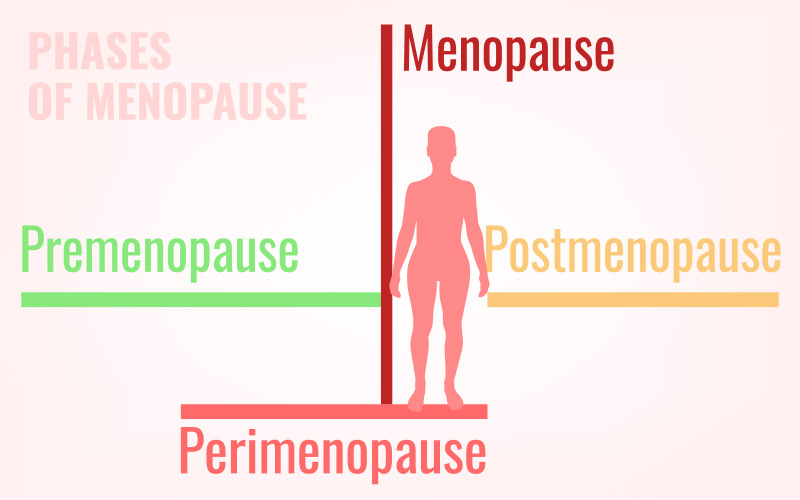Understanding Menopause: More Than Just a Phase
Menopause is a natural biological transition that marks the end of a woman’s reproductive years. It is diagnosed when a woman has gone 12 consecutive months without a menstrual period, with no other medical explanation. Typically occurring between ages 45 to 55, menopause brings significant hormonal changes, primarily due to declining estrogen and progesterone levels.
But menopause isn’t a single event. It unfolds in stages:
🔹Perimenopause: The transitional phase often starting in a woman’s 40s. Characterized by hormonal fluctuations and symptoms like irregular periods, hot flashes, mood swings, and sleep disturbances.
🔹Menopause: The point of 12 months without menstruation.
🔹Postmenopause: The stage following menopause, where symptoms may persist and health risks (like osteoporosis and heart disease) increase due to low estrogen levels.
For a broader view of women’s health, check out our Women’s Nutrition page.

Common Menopause Symptoms
Women may experience a range of physical and emotional symptoms, including:
✔ Hot flashes and night sweats
✔ Mood swings, irritability, and anxiety
✔ Sleep disturbances and fatigue
✔ Vaginal dryness and discomfort during intercourse
✔ Urinary incontinence and UTIs
✔ Weight gain and slowed metabolism
✔ Brain fog and memory issues
✔ Joint pain and decreased muscle mass
Understanding these symptoms is crucial to managing them effectively through nutrition and lifestyle.
Nutritional Needs During Menopause
Nutrition plays a key role in managing symptoms and preventing long-term health complications like osteoporosis, cardiovascular disease, and weight gain. Key nutrients include:
1. Calcium & Vitamin D
👉Support bone density and reduce fracture risk.
🥗Sources: Dairy, fortified plant milks, leafy greens, sardines, and egg yolks.
2. Omega-3 Fatty Acids
👉Combat inflammation, support heart health, and may ease mood swings.
🥗Sources: Salmon, mackerel, flaxseeds, chia seeds, walnuts.
3. Phytoestrogens
👉Plant compounds that mimic estrogen to alleviate hot flashes and improve bone and heart health.
🥗Sources: Soy products, flaxseeds, chickpeas, lentils.
4. Protein
👉Preserves muscle mass and supports metabolism.
🥗Sources: Lean meats, dairy, legumes, eggs, nuts, seeds.
5. Magnesium & B Vitamins
👉Aid in sleep regulation, stress reduction, and energy metabolism.
🥗Sources: Whole grains, leafy greens, legumes, seeds.
6. Fiber
👉Improves digestion, manages blood sugar, and supports weight control.
🥗Sources: Whole grains, fruits, vegetables, legumes.
For detailed nutrition plans at every stage, visit our Women’s Nutrition programs.
🚫Foods to Avoid
✔ Some foods may worsen menopause symptoms or increase health risks:
✔ Spicy foods (trigger hot flashes)
✔ Caffeine and alcohol (disrupt sleep and raise anxiety)
✔ Processed foods and refined carbs (cause weight gain and insulin spikes)
✔ High-sodium and trans-fat-rich foods (impact heart health)
Lifestyle Tips to Manage Menopause
Stay Active
✅Incorporate strength training, cardio, and flexibility exercises to support bone health, manage weight, and boost mood.
Improve Sleep Hygiene
✅Maintain a sleep routine, avoid screens before bed, and keep your bedroom cool.
Manage Stress
✅Try yoga, meditation, deep breathing, or CBT to manage mood and anxiety.
Hydration
✅Drink 8–12 glasses of water daily to combat dryness and flush toxins.
Pelvic Floor Exercises
✅Prevent urinary incontinence and improve sexual health.
Natural & Home Remedies
✅Dress in breathable layers to manage hot flashes
✅Limit trigger foods and beverages
✅Use herbal teas and relaxation techniques
✅Incorporate foods rich in phytoestrogens
✅Talk to your doctor about supplements like black cohosh, flaxseed, magnesium, and vitamin D
🔍 Quick FAQs
What is the best diet for menopause?
A whole-food diet rich in calcium, vitamin D, phytoestrogens, omega-3s, and lean protein supports hormone balance and long-term health.
How can I naturally manage menopause symptoms?
Stay active, eat a balanced diet, reduce stress, avoid triggers like caffeine/alcohol, and stay hydrated. Consider phytoestrogen-rich foods.
What are phytoestrogens and how do they help?
These plant-based compounds mimic estrogen. Foods like soy, flaxseeds, and chickpeas can ease hot flashes and support hormonal balance.
Why Choose NutriPrior for Menopause Support?
At NutriPrior, we understand that every woman’s journey is unique. That’s why we offer:
📌Personalized nutrition plans tailored to your symptoms
📌Expert-led group programs and workshops
📌Access to a certified nutritionist for 1:1 support
📌Educational resources and downloadable toolkits
🩺 Trusted by 5,000+ women in our wellness community. Backed by clinical nutrition experts.
Let us help you embrace menopause with confidence, clarity, and care.
Explore our Nutrition Programs designed for every phase of womanhood.
Download Our Free Menopause Nutrition Guide
Get a complete 7-day meal plan, symptom tracker, and lifestyle tips in our FREE downloadable toolkit — curated by NutriPrior experts to help you manage menopause naturally and confidently.
By downloading, you’ll also receive exclusive tips, recipes, and wellness insights directly from our team—supporting you every step of the way.
